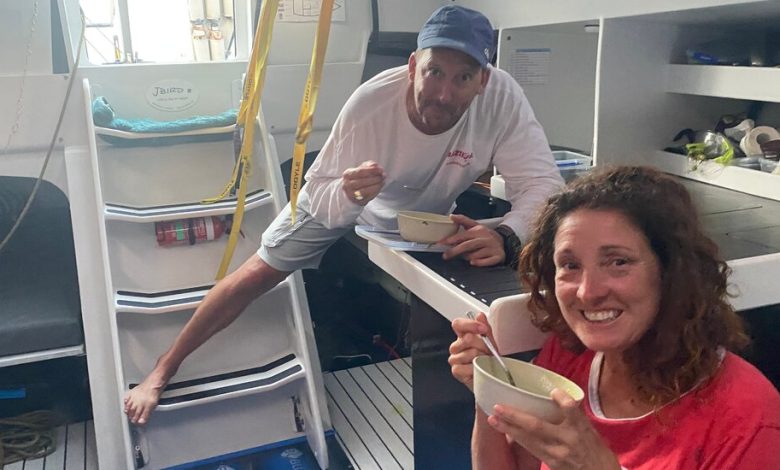Not-So-Gourmet Yacht Food

Camp food or premade home-cooked food? Bananas yes or bananas no? Culinary ambitions in the Rolex Sydney Hobart Yacht Race don’t add up to any of the popular images of luxury yachting.
At the extreme end, Bruce Watson and Frederic Chanut plan to sail as a two-person crew on Watson’s 39-foot Imalizard, a boat so stripped out, to save weight, that the cabin doesn’t even have a floor. Going below deck to cook, they will be standing on the innards of the hull. Their camp stove cooking will be limited to heating water for Watson’s idea of a hot dinner, which he described as “those noodle packs that you buy in convenience stores.”
Watson snubs his nose at another option favored by competitors obsessed with boat weight: supposedly upscale freeze-dried nutrition packets, sold at outfitting stores for as much as $75 each. He calls those packets “the only food that tastes the same coming up as going down.”
Watson also carries fruit, nuts and energy bars, and he recognizes the irony in teaming with Chanut, who hails from the French gastronomic epicenter of Lyon. However, they’ve won the two-person division twice before, and Watson declared, “It’s only three days. Well, maybe four. It’s a great way to lose three kilos (about six and a half pounds).”
“It easily beats the 5-2 diet,” he added, referring to a diet on which one eats routinely five days a week, then restricts calories to 500-600 per day twice a week.
Comfort is relative on the ocean, as any seasick passenger on a cruise ship might attest. The higher the wind and waves, the lower the appetite, and the 628 nautical miles separating Sydney from Hobart, the capital of Tasmania, are notorious for switching overnight from sparkling conditions to smash-mouth.
In the past, there have been yachts that raced to Hobart with a chef aboard, but a race that so often includes stormy weather just isn’t suited for fine dining. One hot meal per day is a popular ideal, and when one does appear, that is a racing sailor’s definition of luxury.
Jennifer Carnell is a believer. She grew up on her family’s motor-yachts where spartan habits were neither needed nor valued, but she absorbed the ways of the sea. In the Sydney Hobart race, she will navigate Solera, a 44-foot sloop and past division winner intended more for passage making than for racing. Sails go out and in at the touch of a button. “I’m spoiled,” she said.
Food management and “keeping everyone hydrated” are the other chores that Carnell embraces aboard Solera, which has a gas oven in the walk-in galley.
“We don’t like packaged food,” she said. “I bake three evening dinners ahead of time and freeze them in individual containers for reheating. There might or might not be a chicken casserole, but there is always, always, always a lasagna.”
As on most boats, on the Solera, every sort of food that can be consumed with one hand — fruit, energy bars and juices — is available throughout the day and night. On Hilary Arthure’s 35-foot Wyuna, the fare is managed in a similar fashion, but never with bananas. They have been considered bad luck aboard boats for centuries. “That’s the superstition,” Arthure said, and she honors it.
As a skipper who’s very committed to taking care of her crew, she normally cooks and freezes meals, but for this race, the boat was hauled by truck about 2,400 miles from Perth, on the Indian Ocean side of Australia. Being away from her home kitchen, Arthure has outsourced the food prep. Wyuna has no oven, but the skipper/cook will be doing her best to deliver hot-dinner approximations for her crew of seven, with a special thought, she said, for “our two young fellas who could eat their weight every day.”
Arthure said that, after a first night with hot food that has been prepared ahead of time, “Meals come vacuum-bagged for boiling in water. I can fit four meals into one pot. Or we have nuclear food — just add water — from survival shops. Everything has to be spoonable. Quick rice works. Hard-boiled eggs are a good exception because they keep, and the shells can go overboard.”
This will be Arthure’s third race to Hobart, but the first on her own boat. She earned multiple degrees on her way to a teaching career, but the race organizers’ stringent rules on safety and inspection — implemented after the loss of five boats and six lives in 1998 — have her feeling “like I’m working toward a Ph.D. in project management.”
From Hobart, she will sail Wyuna homeward on her own time, with as much food in the larder as she darned well pleases.
Aboard Richard Hudson’s Pretty Woman, a loyal cohort divides the chores of precooking and freezing evening meals, then serving them aboard the 45-foot sloop during the race. “That gives us a surprise factor,” Hudson said. His oven is “our compromise as a race boat.”
On his boat, lunchtime sandwiches are made fresh, again as a team effort, though on some boats even fresh sandwiches would be a compromise. Snacks have to keep coming day and night, with water bottles tended. If people are not hydrated, Hudson said, “They get seasick.”
An international match racing veteran, Hudson will be sailing his 16th Hobart, and he believes in bringing young people onto a boat that is 27 years old, but still successful. His crew of 12 includes 11 Sydney Hobart race veterans, six of them younger than the boat. He is proud of winning the Corinthian division in 2022 — no hired professional sailors for the Pretty Woman — and Hudson will be chasing a repeat while also aiming at a trophy for boats with a crew made up of 25 percent women, or more.
Starting a big race on the heels of a major feast day presents its own demands. Watson, the skipper of Imalizard, stays away from alcohol for 10 days before the start of the race, but Christmas means prime leftovers, “mostly seafood,” before he has to light up the camp stove. Arthure plans to bring a ham to accompany “a boatload of prawns” for a Christmas Day anchor-out with another boat from Western Australia, Simon Torvaldsen’s Atomic Blonde. It should be a day of carefully measured indulgence, but as to the limits, Arthure said, “That’s part of building the team.”



